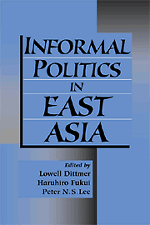A PERSPECTIVE, DEFINITIONS, AND EXAMPLES
Politics is, in Harold Lasswell's elegantly spare definition, “Who gets what, when, how.” At the expense of its elegance of parsimony, we might embellish it a little as: “Who gets what, when, how, and at whose expense.” The last phrase is added to make it explicit that politics is concerned with the distribution not only of the benefits derived from the use or consumption of goods and services, but also the costs required for their production and supply. The “what” here is to be understood as primarily a public, as opposed to private, good or service. Since, however, who gets a public good or service, how, and at whose expense critically affects who gets a private good or service, how, and at whose expense, we would leave the “what” in Lasswell's original formulation alone.
We adopt this broad and open-ended definition of politics rather than David Easton's well known but more restrictive definition: “authoritative allocation of values.”
As we will attempt to explain in this introduction and the chapters that follow, we believe, for both ontological and epistemological reasons, that any allocation of the costs and benefits of the production, distribution, and consumption of public goods and services – whether authoritative or questionable, legitimate or illegitimate, legal or illegal, overt or covert – is fundamentally political and therefore a proper subject for investigation by the political scientist.
